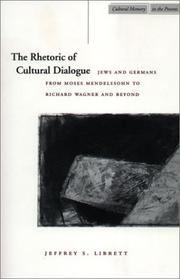
Overview
- Series
- Cultural memory in the present
Cultural memory in the present. - Format
- Book
- Published
- Stanford, Calif. : Stanford University Press, [2000]
©2000 - Locale
- Germany
- Contents
-
Introduction: from the rhetoric of dialogue to the end of Jewish-German emancipation
Judaism between power and knowledge: the undecidability of the Law in Moses Mendelssohn's Jerusalem, or On religious power and Judaism (1783)
The ontorhetoric of "refined pantheism" in Moses Mendelssohn's Morning hours, or Lectures on the existence of God (1785)
The birth of German Romanticism out of the "dialogue" between (Protestant) spirit and (Jewish) letter: Friedrich Schlegel's "On Lessing" (1797) and its "Conclusion" (1801)
Duplicitous engenderments of the literal spirit: Friedrich Schlegel's "On philosophy: to Dorothea" (1798) and Lucinde (1799)
Resisting "fulfillment": the undecidable limit between figural and literal in Dorothea Veit's Florentin: a novel (1801)
Protestant negativity as "prefiguration" of Neo-Catholic positivity in Friedrich Schlegel's Lessing's thoughts and opinions (1804)
The reversal of emancipation on the left: Karl Marx's "On the Jewish question" (1843)
The reversal of emancipation on the right: Richard Wagner's "Judaism in music" (1850)
Postscript: through modernism to
"emancipation" from Holocaust memory? - Notes
-
Includes bibliographical references (pages 371-384) and index.
Introduction: from the rhetoric of dialogue to the end of Jewish-German emancipation -- Judaism between power and knowledge: the undecidability of the Law in Moses Mendelssohn's Jerusalem, or On religious power and Judaism (1783) -- The ontorhetoric of "refined pantheism" in Moses Mendelssohn's Morning hours, or Lectures on the existence of God (1785) -- The birth of German Romanticism out of the "dialogue" between (Protestant) spirit and (Jewish) letter: Friedrich Schlegel's "On Lessing" (1797) and its "Conclusion" (1801) -- Duplicitous engenderments of the literal spirit: Friedrich Schlegel's "On philosophy: to Dorothea" (1798) and Lucinde (1799) -- Resisting "fulfillment": the undecidable limit between figural and literal in Dorothea Veit's Florentin: a novel (1801) -- Protestant negativity as "prefiguration" of Neo-Catholic positivity in Friedrich Schlegel's Lessing's thoughts and opinions (1804) -- The reversal of emancipation on the left: Karl Marx's "On the Jewish question" (1843) -- The reversal of emancipation on the right: Richard Wagner's "Judaism in music" (1850) -- Postscript: through modernism to--"emancipation" from Holocaust memory?
Physical Details
- Language
- English
- ISBN
- 0804736227
0804739315 - Physical Description
- xxiii, 391 pages : illustrations ; 24 cm.
Keywords & Subjects
- Subjects
- Jews--Germany--History--1800-1933. Jews--Germany--Intellectual life--18th century. Jews--Germany--Intellectual life--19th century. Germany--Civilization--Jewish influences. Germany--Ethnic relations. Judaism--Relations--Christianity. Christianity and other religions--Judaism. Jews--Cultural assimilation--Germany.
- Record last modified:
- 2024-06-21 15:24:00
- This page:
- https://collections.ushmm.org/search/catalog/bib69014
Additional Resources
Librarian ViewDownload & Licensing
- Terms of Use
- This record is not digitized and cannot be downloaded online.
In-Person Research
- Requires Research Visit
- Plan a Research Visit
- Check Nearby Libraries
-
Request in Shapell Center Reading Room
Bowie, MD



